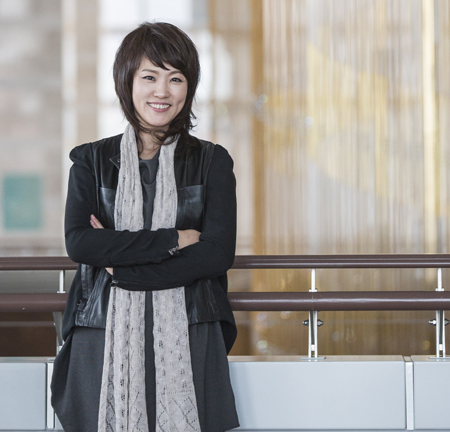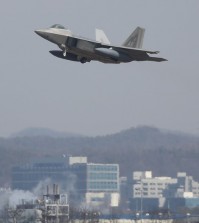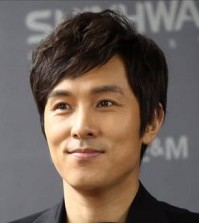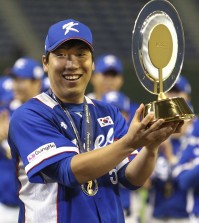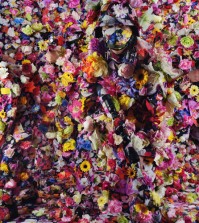- California Assembly OKs highest minimum wage in nation
- S. Korea unveils first graphic cigarette warnings
- US joins with South Korea, Japan in bid to deter North Korea
- LPGA golfer Chun In-gee finally back in action
- S. Korea won’t be top seed in final World Cup qualification round
- US men’s soccer misses 2nd straight Olympics
- US back on track in qualifying with 4-0 win over Guatemala
- High-intensity workout injuries spawn cottage industry
- CDC expands range of Zika mosquitoes into parts of Northeast
- Who knew? ‘The Walking Dead’ is helping families connect
Jazz vocalist Na Youn-sun gaining worldwide recognition
By Park Jin-hai
Koreans rejoiced as Sochi passed on the Olympic flag to PyeongChang, the host of the next Winter Games in 2018.
The celebratory mood that night escalated when Korean artists performed their country’s beloved folk song “Arirang,” against the background of mountain ranges and a flock of cranes flying in the night sky.
The first part of the song was sung by the fabulous soprano Jo Su-mi. What came next was jazz singer Nah Youn-sun’s performance of “Arirang,” in a way less mainstream but nevertheless heartwarming.
In fact, Nah has a long history with the national folk song. Not only did she sing it for the inauguration ceremony of President Park Geun-hye last year, she also included various regional variations in her global-selling hit albums.
“I always thought that the Korean language wasn’t made for jazz,” said Nah during the interview with The Korea Times.
“But, when my French friends said their language is for chanson and not for jazz, I was surprised. To my ears, French is one of the most beautiful languages. Then I realized that I have this same kind of prejudice against my own language.”
Although not as well-known to her fellow Koreans, Nah is already an established name in the world of jazz. She spends more than eight months a year overseas and her yearly schedule is booked with over 100 performances, mainly in European countries.
She became the first professor of Asian origin to teach at the CIM Jazz School in France in 2000.In 2009, she was given the Order of Arts and Letters by the French Minister of Culture.
On March 12, 2013, her eighth album “Lento” topped the jazz charts in 14 European countries, including France, where it remained No. 1 for seven weeks.
She has also held a solo concert in the prestigious Chatelet Theater in Paris, selling out the venue a month in advance.
But the 44-year-old Korean native is by no means your classic jazz singer.
Born and educated in Korea, whose jazz history is near nascent compared with that of the United States and Europe, Nah did not know much about the genre until she went to France in 1995 in the hopes of learning to sing better.
Her voice was never considered ideal for jazz, but her wide vocal range is clear and refreshing. When she performed in a quintet, she used her entire body to generate her distinct voice.
“I initially tried to copy the singing style of legendary singers, according to what was written in books. And I was disappointed, since my voice wasn’t what it was supposed to be like.
“Then, I formed a quintet, composed of people from various countries. We have experimented with many new things and adopted them into our music,” she said.
Her 10-year experiment in the quintet enabled her to develop her own vocal style.
“Some people still dislike my singing style, saying that it is not jazz. But, if I thought that the jazz of the 1930s is the one and only jazz music, I think I wouldn’t have become the jazz singer that I am today,” she added.
For her second album “Light for the People,” released in 2002, she wrote the song “One Way” with repetitive and easy-to-pronounce Korean verses. When she premiered the song for a French audience at a small concert, she was surprised to find them singing the lyrics after her.
“The song was on the radio one day. And more and more people sent in requests because they found jazz music sung in Korean strange but fresh. Then the radio audience started to pay attention to me,” she said. “So basically, the Korean language made me better known to the French listeners.”
However, she says that she was not always proud of her Korean music roots, until about 20 years ago.
She says there were moments when she forgot she was a Korean. Consumed by the thought of mastering Western music, she believed that she needed to immerse in it fully.
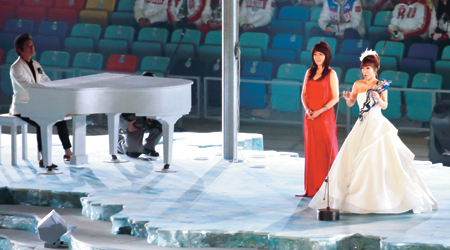
Nah Youn-sun, second from right, sings Korean folk song “Arirang” with two other singers, heralding the 2018 PyeongChang Winter Olympics to be held
in Korea, at the closing ceremony of the 2014 Sochi Winter Olympics in this Feb. 23 file photo. (Yonhap)
“Everyone whom I performed for at my concerts were Westerners, and I subconsciously thought I was one of them. Then, I realized that if I forgot who I was, I wouldn’t be able to look at myself in the mirror,” she added.
She says, even though the “Korean jazz artist” tag has always followed her no matter what country she’s performing in, she now considers it a good thing.
“I realized that they pay more attention to me since I am Korean.”
Her sensitive, sentimental and rich performance during her solo concert at the Chatelet Theater in March of last year prompted a 15-minute standing ovation. Because of the explosive audience reaction, the theater told her that she can hold her concert there any time.
Asked about that moment, she said, that she doesn’t remember a thing. “It was my dream coming true. I only knew about the audience reaction after reading the local newspapers. That evening felt like a fleeting moment.”
Nah says what is good about jazz is that it values improvisation. “Jazz gives young artists the opportunity to perform with much older and experienced artists. If only can younger musicians fully play to their talents and not become intimidated, performing with seasoned artists makes for an interesting —but not strange — combination.”
“When I was performing in small concerts as a lesser known artist in France, I was never asked whether I am a student or how old I am. I was respected as a musician. I think that is why Parisians enjoy culture more in general.”








